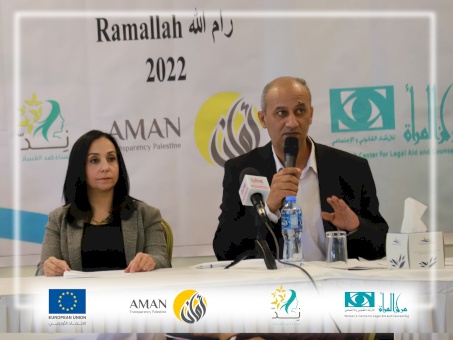
In partnership between AMAN and Women’s Centre for Legal Aid and Counselling (WCLAC);
Conference launched on the impact of gender-based corruption on health service provision in Palestine
Ramallah – With the participation of several government bodies, civil society actors and grassroots organisations working on women's rights, the Coalition for Accountability and Integrity (AMAN) and Women’s Centre for Legal Aid and Counselling (WCLAC) held a Women against Corruption conference. Entitled The Impact of Gender-based Corruption on the Health Sector, the conference came up with recommendations for decision makers to make policies and develop mechanisms and measures to prevent gender-based corruption, particularly in the health sector.
WCLAC: We call for improving the legal environment to criminalise gender-based corruption and establish strict mechanisms against corrupt individuals
In her welcoming remarks, Ms. Amal Abu Surour, WCLAC Programme Director, highlighted that gender-based corruption was a new concept, especially in the Palestinian context. In Palestine, current efforts to prevent gender-based corruption and inequality in service delivery need to be backed by national and community action. Contributions should be made to create mechanisms and measures to put an end to corruption in social development and health sectors. According to Abu Surour, gender-based corruption hides behind other forms of corruption. Affected women are afraid of reporting and filing complaints against gender-based corruption in fear of social stigmatisation, allowing a greater opportunity for corrupt individuals to persist in corrupt practices. In this vein, women are at an increased risk of becoming victims to corruption.
Abu Surour emphasised the need to enshrine principles of the fight against gender-based corruption within the health sector. This will allow a better space for women to receive services, maintain their dignity, and enhance service quality. In addition to developing the legal framework with a view to criminalising forms of gender-based corruption, clearer and stricter mechanisms should be in place to hold accountable corrupt individuals. Administrative regulations and a user-friendly complaint handling system will be created, ensuring the privacy of female whistleblowers.
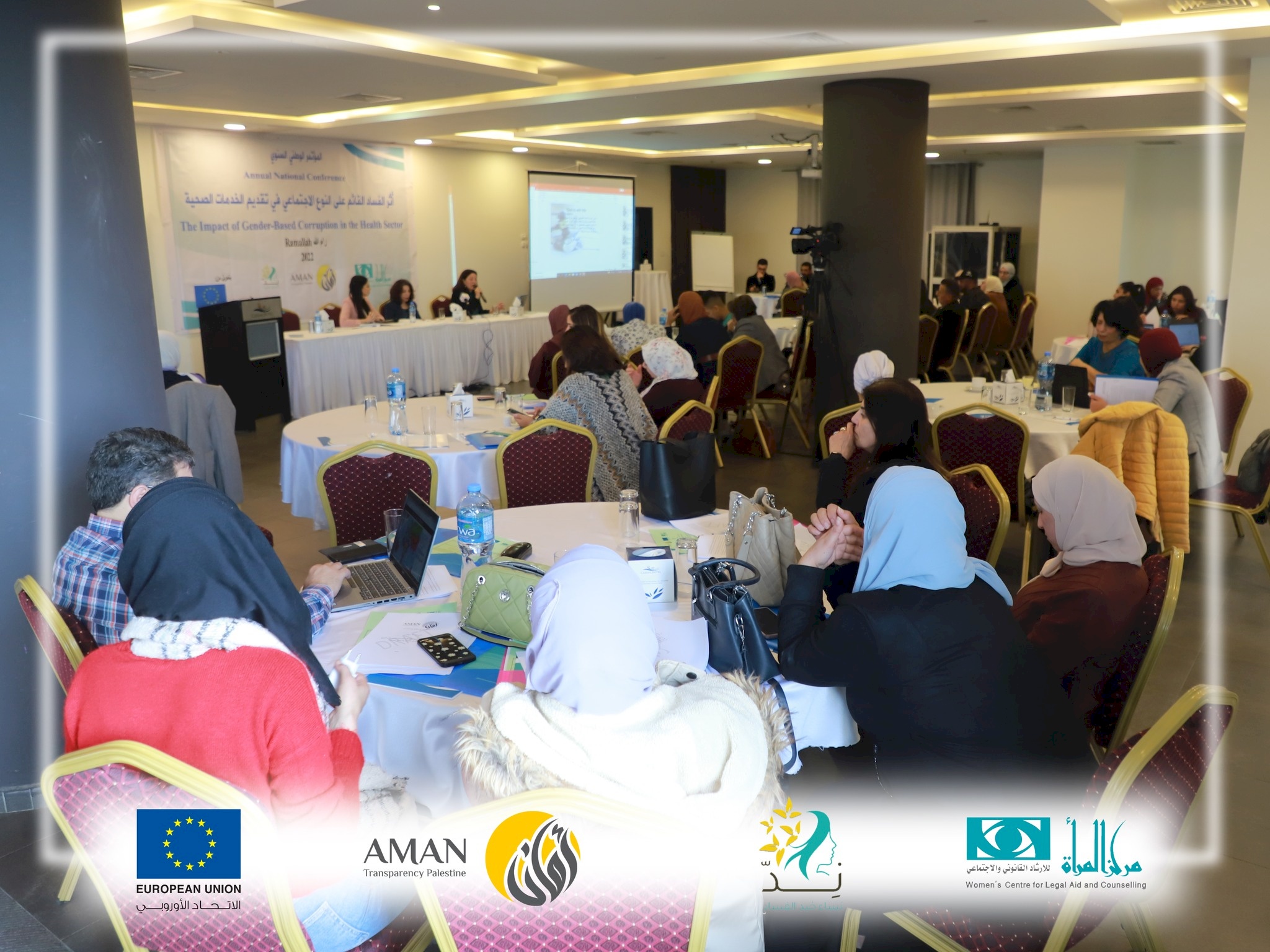
AMAN: National dialogue will be launched with relevant bodies to discuss the impact of gender-based violence on women in particular
Mr. Issam Haj Hussein, Executive Director of AMAN, stated that, for the second year and in partnership with the WCLAC, AMAN has implemented the Women against Corruption project, which centred on raising public awareness about the importance of creating a system of integrity values and fight against corruption within Palestinian community institutions. Premised on citizens, a culture will be bolstered, rejecting all forms of corruption. To this end, coalitions, networks, and partnerships will be established with different sectors. An inclusive national dialogue will be launched to address the impact of gender-based corruption on women. Fight against corruption will be incorporated into the strategies of action of civil society groups and grassroots organisations working on women’s rights.
Haj Hussein also highlighted the need to immunise the health sector against gender-based corruption by building partnerships and integrating roles with the Ministry of Health (MoH). The Ministry has the primary responsibility in this area.
Need for preventive measures against widespread gender-based corruption, including sexual harassment in the workplace, bribery, and sexual extortion
In the first session, Ms. Intesar Hamdan, Director of Awareness Raising and Community Outreach at AMAN, made a presentation on “The concept of gender-based corruption”, explicating on the perception and forms of corruption, including sexual harassment in the workplace, bribery, and sexual extortion. According to Hamdan, there are indicators of certain practices and forms of gender-based corruption. These need to be an object of focus in order to devise a preventive measure and immunise Palestinian society. To this effect, the paper recommended the need to pay attention to and include gender concepts when corruption indicators are examined. While raising awareness of the concept and patterns of gender-based corruption, accountability processes should be strengthened at internal and external oversight bodies as well as at inspection agencies in both the public and the private sectors.
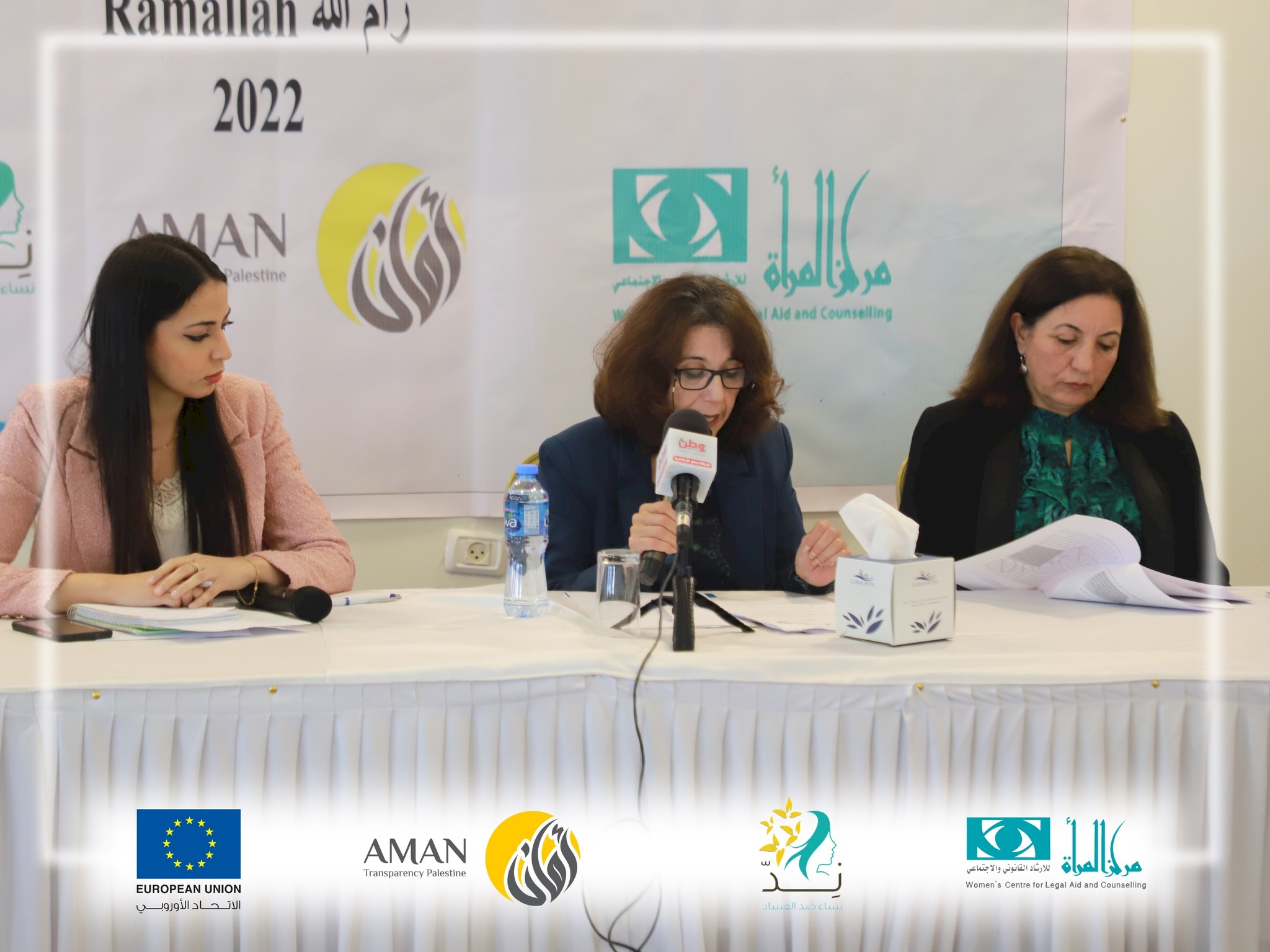
The national legislative framework needs to be aligned, ensuring gender responsiveness and equitability
Lamya Shalaldeh, a researcher, presented a paper on “Preventive measures against gender-based corruption risks in health service provision”. Shalaldeh found out a close link between pervasive corruption in discriminatory environments and inequitable recognition of fundamental rights. This is also the case of the Palestinian legislative framework, which is inadequate for the protection and realisation of the rights of vulnerable groups, including women.
In her paper, Shalaldeh produced key recommendations. The national legislative framework needs to be brought in line with relevant international conventions. National regulations particularly include the Public Health Law No. 20 of 2004, Regulation on the National Health Insurance, and MoH Procedure Manual of 2016. Additionally, the National Health Strategy should be consistently improved to fulfil the needs of vulnerable groups and women. Procedures will be developed to provide full independence to oversight committees beyond the scope of the MoH, ensuring that transparent and objective reports contribute to taking appropriate actions.
Targeting female citizens, need to create a community awareness programme and complaint handling mechanism for gender-based corruption
In the second session, Ms. Shatha Odeh, a researcher, delivered a presentation on “The National Health Strategy and how responsive it is to fight corruption both generally and from a gender perspective”. Findings of this presentation confirmed that the fight against corruption required collective efforts, expertise, and partnerships with civil society groups and health actors.
The paper recommended that the concept of gender-based corruption be integrated into the MoH operations. Gender-based corruption will also be introduced to health workers and health service beneficiaries. Although the MoH moderates a health education programme, gender-based corruption is not included in education exercises. Furthermore, a community awareness programme, manuals, and guidance need to be developed to publicise gender-based corruption and relevant complaint handling mechanisms. While planned anti-corruption efforts are enhanced, the fight against gender-based corruption will be included as an inherent policy component.
According to Odeh, the Code of Conduct for the Civil Service should be amended, taking account of gender-based corruption. An integrated training programme will be developed so as to cover the Code of Conduct for the Civil Service, promotion of integrity and transparency, and gender-based corruption risk management. Sufficient budget appropriations should be earmarked to this training exercise. Along this vein, cooperation can be undertaken with relevant institutions. Also, partnerships can be built with anti-corruption agencies. Memorandums of understanding can be concluded with a view to exchanging expertise, building capacities, and scaling up the monitoring of gender-based corruption. Starting with gender units, a proposal will be made to devise a category of gender-based corruption. An anti-violence programme will be created within the MoH Women’s Health Department, also involving a component to monitor gender-based corruption.
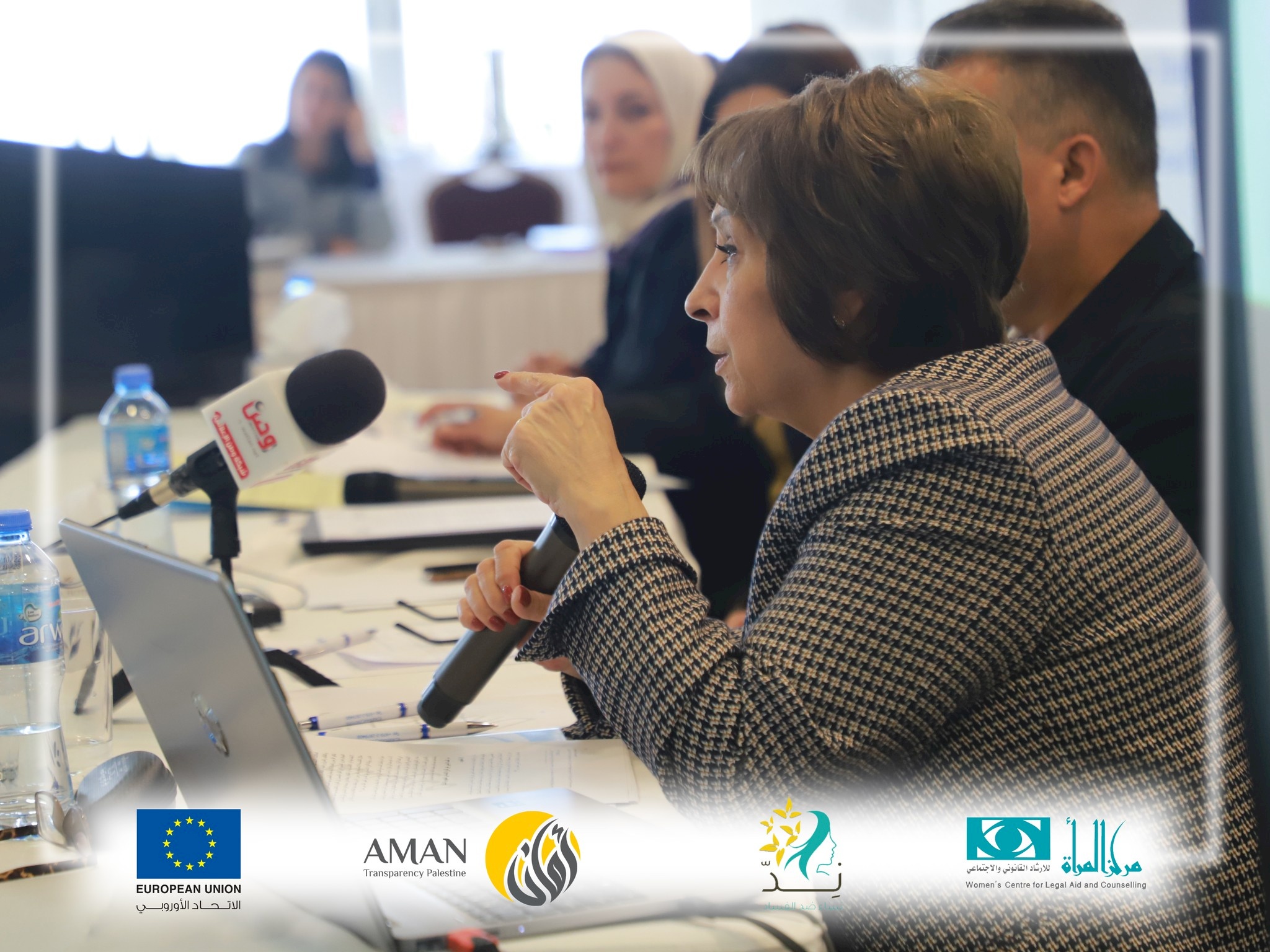
Partnership with beneficiaries and affected groups is required to investigate and assess the impact of gender-based corruption
Presenting on “The MoH Oversight Unit and complaint handling system,” Mr. Nabil Dweikat, a researcher, pinpointed the lack of a comprehensive and proper approach to assessing the impact of gender-based corruption. To the detriment of the monitoring mechanisms, affected women are reluctant to report or file complaints on this form of corruption in fear of social stigmatisation.
The paper recommended that, in the Palestinian context, the concept of gender-based corruption be developed to help identify approaches to monitoring, investigation, and research. This improvement will also contribute to creating indicators to monitor, document, examine, and assess the impact of gender-based corruption. To this end, beneficiaries and/or affected groups should be involved in investigating, assessing, and making recommendations and proposals to reduce the impact of gender-based corruption on women, young people, senior citizens, persons with disabilities, and other vulnerable groups. Together with complaint handling procedures, Dweikat also recommended that detailed regulations and mechanisms be approved to help prevent forms of gender-based corruption.
Women and girls with disabilities are most vulnerable to poverty, discrimination, and ill treatment
The conference was concluded with a paper on “Women and girls with disabilities in the health sector” by Ms. Shurouq al-Afandi, a researcher of the QADER for Community Development. Addressing their current situation, Al-Afandi focused on the multiple challenges which women and girls with disabilities faced because they had the least access to services and social protection systems. These women and girls are the most vulnerable to poverty, discrimination, and ill treatment.
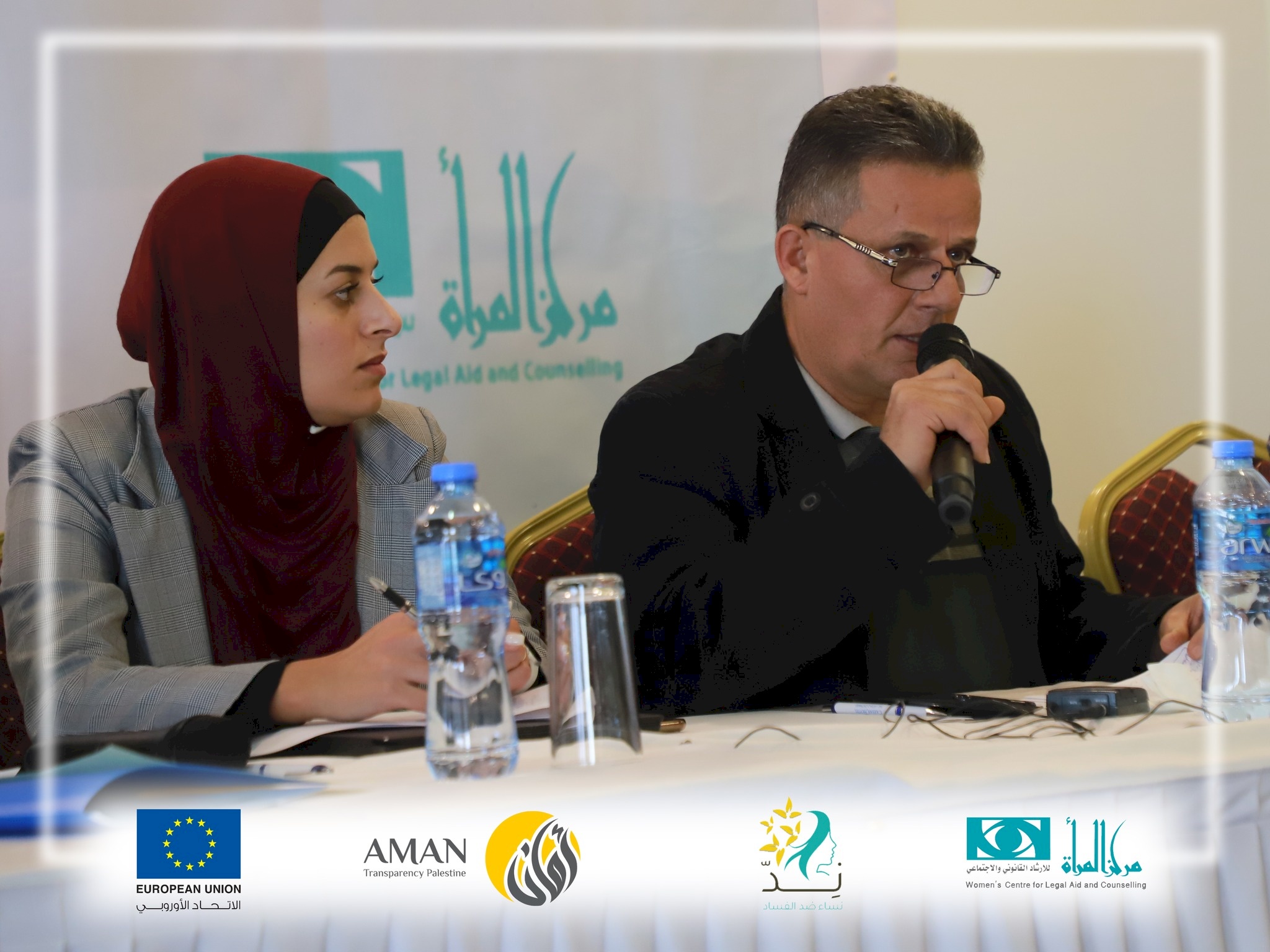
Women with disabilities and relevant institutions should be engaged in the National Health Strategy process
The paper also reviewed deficient regulations and policies in force in Palestine, including the Public Health Law and Law on the Protection of Persons with Disabilities, adversely affecting the provision of health services to people with disabilities. In addition to their representative institutions, women and girls with disabilities were not involved in the debate over the National Health Strategy 2021-2023, which had been approved by the MoH.
Al-Afandi made an overview of the National Referral System for Women Victims of Violence and of the services delivered to persons with disabilities. Specialised health centres for mentally disabled persons are lacking, making these people even more vulnerable and deprived of physical and mental health care. Persons with disabilities are challenged by short health services at health clinics and centres in remote areas. Due to limited and seasonal rehabilitation programmes, medical staff are inadequately equipped to treat persons with disabilities by type of disability and age. Medical personnel also have negative perceptions of persons with disabilities. Buildings and facilities are not aligned to the needs of persons with disabilities. For example, ramps are only provided at hospitals. A few newly constructed hospitals use elevator panels in braille. Still, alignments are generally limited to cities.
Participants were unanimous in their view that the values of integrity and fight against corruption need to be promoted within civil society organisations. Revolving around citizens, a culture will be created to turn down all forms of corruption, particularly on the basis of gender.
